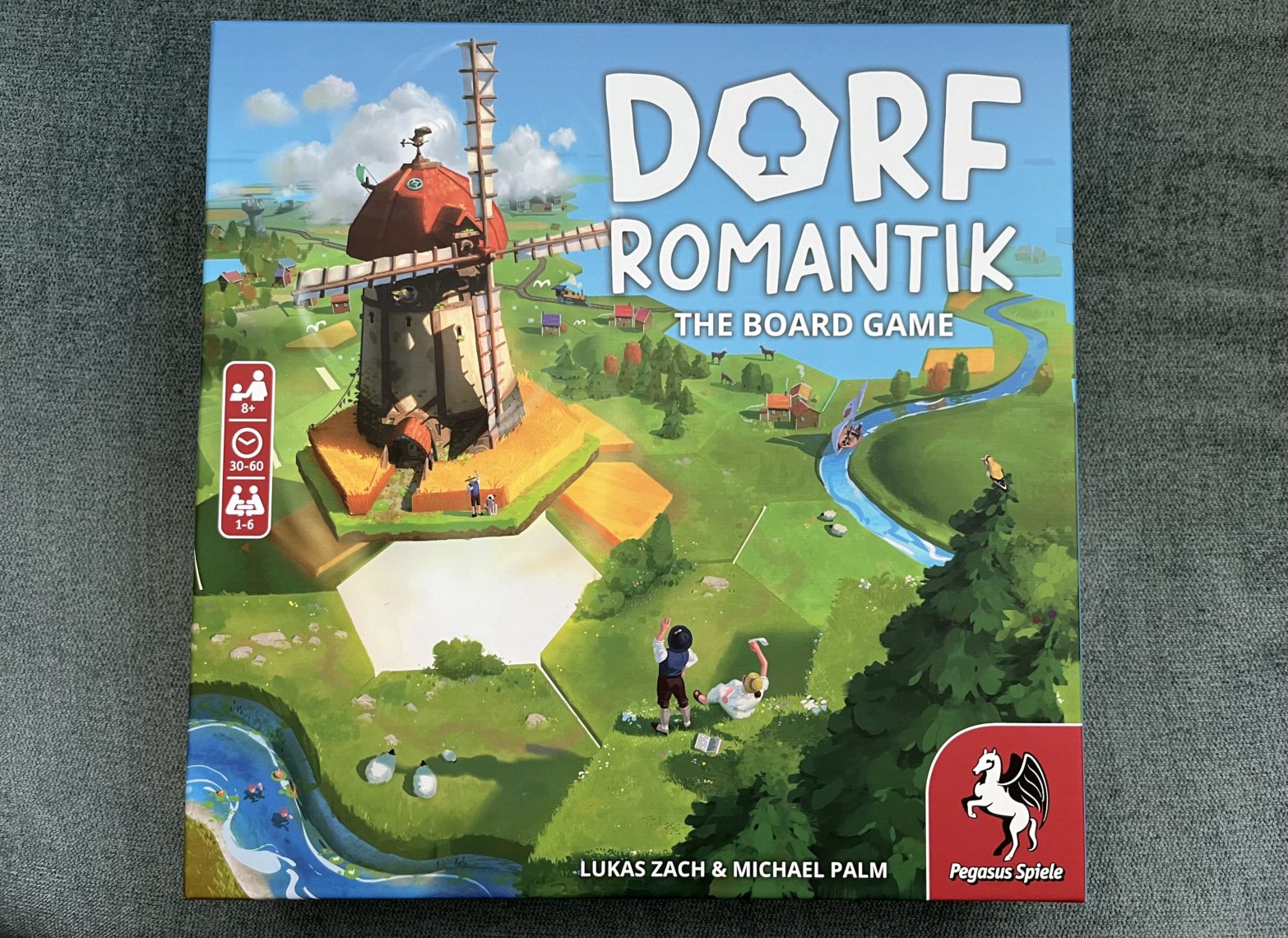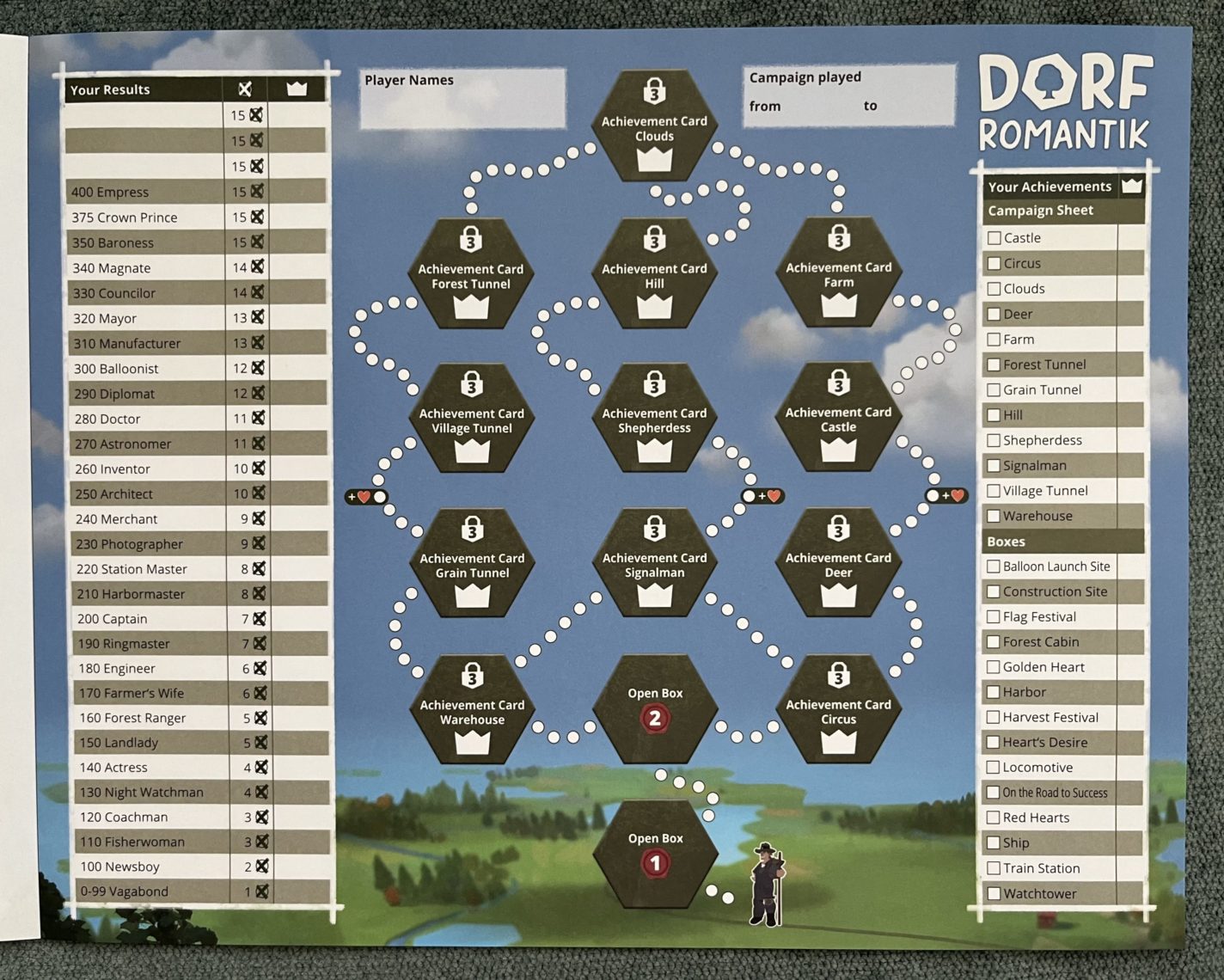Dorfromantik was one of the sleeper videogame hits of COVID-19. Released on March 21, 2021, its contemplative, puzzly tile-laying gameplay was complemented totally by its super-chill soundtrack (composed by Laryssa Okada and Pygoscelis and tonally very much in the vein of Jose Gonzalez’s solo acoustic albums). I first heard about it when one of my favorite YouTubers (ManyATrueNerd) and his wife both became obsessed with it, livestreaming head-to-head challenges and getting into deep discussions about gameplay.
For me (along with many in the tabletop world, I assume), Dorfromantik’s success was welcome and highly amusing. For what was Dorfromantik at heart but a tweaked version of Carcassonne? Solo mode only, hex instead of square tiles, and meeples replaced by terrain-completion objectives, and you could keep the game going forever, in theory, if you kept gaining extra tiles by achieving those objectives.
But I’m not knocking Dorfromantik–not at all! According to Steam I’ve spent almost 150 hours playing it–much more than any digital port of Carcassonne–so I must like it. If anything, it shows how presentation and immersion make all the difference. The little animations on the tiles, the streamlined yet strategic gameplay, and the hypnotic soundtrack all work in Dorf’s favour.
Its popularity began to spread through my tabletop friend network. People started posting screenshots of high scores and HUGE layouts of completed games. I wondered if and when Dorf would be licensed for actual physical tabletop play, and if so what that would look like.
I’ve written before about the possible perils of porting from videogames to tabletop and vice versa. Gameplay, components (and fiddliness thereof), and player interaction rarely translate from one media to the other without considerable adaptation.
Yet with Dorf we had a videogame that felt, for all intents, like a boardgame–yet it was not. That made it a slam-dunk in terms of translating from digital to analog–or did it? So when PegasusSpiele released Dorfromantik: The Board Game in late 2022, the natural question was: slam-dunk or air-ball?

The verdict is now in: Dorfromantik: The Board Game just won the coveted Spiel des Jahres for Game of the Year for 2022. So clearly lots of people–lots of German people anyway–felt the boardgame succeeded. Let’s look at why that might be so.
I don’t know how much say the Dorf videogame dev team had in the boardgame. They are credited on the last page of the rules along with Lukas Zach and Michael Palm, as well as the illustrator of both versions Paul Riebe (good call there, btw; changing art styles would have been way too jolting). But only Zach and Palm are the only ones credited on BGG. They’ve been collaborating for about ten years; their first hit together was 2012’s The Dwarves followed soon after by 2013’s Bang! The Dice Game.
Either way someone had to decide whether the tabletop version should be competitive or co-operative (or include both as options). Each mode has things going for it. In the end, Dorf: TBG is co-operative, and I think that was the right choice, being more in the contemplative spirit of the original.
Similarly, I don’t know whose idea it was to make the game into a resettable campaign–but once again I applaud. It flows naturally from the way different types of tiles are unlocked in the original, and also translates achievement-unlocking in a seamless way. The circuitous paths of the Campaign Sheet mean that you can make different choices each time you play a campaign.
Gameplay itself is only slightly more complex than the videogame version: on your turn you either reveal and play a Task tile (if fewer than 3 are in play) or a Landscape tile. Task tiles set goals for contiguous groups of terrain; hexagonal Landscape tiles add to the terrain. The goal is to complete as many tasks as possible before the Landscape tiles run out. Unlike the videogame, you can’t earn bonus tiles for completing Tasks–but you will earn bonus VP at the end of the game for building certain configurations of tiles and tile features which unlock as the campaign progresses.

Now, I don’t always agree with the games that are nominated or crowned at the Spiel des Jahres. 2021’s MicroMacro: Crime City was a fine game-slash-activity, but in a year that saw the incredible innovations of both The Initiative and That Time You Killed Me it was a lost opportunity.
BUT, in the case of Dorf: TBG I think the Spiel jury picked right. Dorfromantik is one of the best ports of a videogame ever, and therefore has the potential to reach a huge audience and expand the hobby. Its gameplay is straightforward but not simplistic. And its presentation, right down to its excellent rules (not a single error or ambiguity, sadly rare today) guarantees a smooth onboarding for both n00bs and veterans. Being fully cooperative and with no mechanic to prevent the Pandemic Effect is a strike against it, at least for some. But if you are looking for a game to introduce someone to the hobby, especially a videogamer who loves the original, you can’t do better than Dorfromantik…at least, not until the Slay the Spire boardgame comes out later in the year (🤞🏻).
Comments
No comments yet! Be the first!